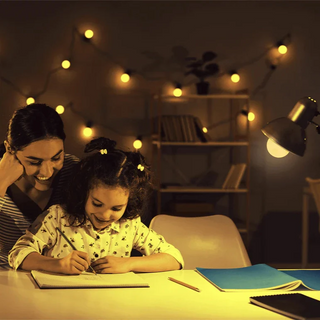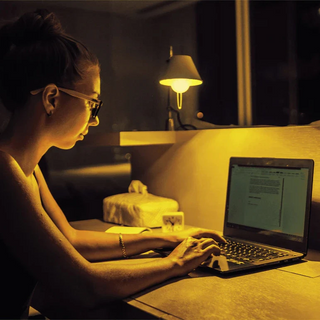The Largest Sleep Study Ever Shows That IF you want to sleep better--and avoid depression-
Don't let that cellphone or any electronic device, disrupt your sleep!
In 2018 Scientists at the University of Glasgow studied 90,000 adults to look at their circadian rhythms . They discovered that not getting a great night sleep has a lot to do with mental health and mood disorders.
The study's lead author put it this way: Dr Laura Lyall, said the team had found a "robust association between disruption of circadian rhythms and mood disorders"
- Circadian Rhythms, think of them as your body's magical time clock, effect super important functions including sleep patterns, body temperature, our immune systems and the release of hormones.
Study recap:
CONFIGURE "RELATIVE AMPLITUDE"
Measured daily rest-activity rhythms by having participants wear activity trackers for a week.
Noted how active individuals were in the busiest 10 hours of each day,
Compared that activity to the least active five hours.
Discovered participants with less of a distinction between active and resting periods scored a lower amplitude,
Lower Amplitude happened either because they were not active enough during while they were awake (or had too much activity)when they were in what should have been "sleeping hours"
Lower Amplitude participants were found to be at higher risk for mental issues-including depression and bipolarity.
Studies have been done before looking at night shift workers and resulting circadian rhythms and depression, but this study used a huge sample and found relationship between body clock interruption and mental health.
Let's Stop Interrupting our Body Clock!!
Want to sleep better and be happier? Well hello! Tech Wellness consistently promotes powering off 2 hours before bed. This study says no later than 10 pm as using mobile phones late at night or waking in the early hours for a food or social media snack perhaps, are bad habits that contribute to "poor sleep hygiene" as the study terms it.
Over and over, science tells us that a good night’s sleep is important to a healthy, happy and long life. The benefits of a good nights sleep are SO many: Happier hormone balance, a potent immune system, lower inflammation, (yes, even less eye puff) and that amazing feeling like you've caught your stride.
Feeling Sleep Deprived?
Here's a sad sleep fact that needs a change: In 2011, the National Sleep Foundation reported that almost fifty percent of people of working age reported that they aren't getting enough restful sleep a night - especially during the work week. Coincidentally, that's around the time that smartphones and other smart devices started overtaking our lives and making our lives more complicated.
Here's How To Get Great Sleep
We can change this people! Happy sleep for everyone is not a dream. Really. I’ve gone from a not-great sleeper to someone who wakes up refreshed and ready every single morning. I don’t even need an alarm clock! How did I go from sleep deprived of dreamland? I’m excited to share the four easy steps you need to take now to get the rest your brain and body crave.Four Steps to Sleeping Well!:
- Reset your body clock in 2 weeks. Help get those circadian rhythms back on track because they determine when you fall asleep, how long you'll stay asleep, the quality of sleep you'll have and when you'll awaken naturally.
- Limit the EMF (electromagnetic frequencies) energy flow at night. EMFs have been connected to lots of sleep-interrupting conditions like insomnia and sleep-dependent performance. This isn't some hunch. I've had Electromagnetic Sensitivity or ES for many years, this means I'm sensitive to the electromagnetic fields. My sleep is easily interrupted when I'm exposed to WiFi, Cellphone, Smart meter or blue tooth energy. I'm particularly sensitive to the high frequency radio waves or RF radiation that comes from wireless devices. I believe it's important for everyone to limit their exposure to wireless EMF anytime they can. I've met many people and spoken to doctors that confirm my hunch that this sensitivity can be triggered by consistent over-exposure.
- Harness the blue-blasting light. It crushes sleep-regulating melatonin and you can fix it with shade control and orange glasses.
- Make your sleep space dreamy. I’ll connect you to melatonin friendly lamps, natural perfect temperature mattress pads and share the research on proven sleep room tactics.
Are you ready? Let’s get you to Dreamland—fast.
STEP 1: The Body Clock Re-set.
Sleep quickly and sweet. Wake up rested. Your body clock is super important to your circadian rhythms as it sets up the time you fall asleep and with what level of ease, how long you stay asleep and when you awaken naturally. The research tells me that I’ll reap all kinds of health benefits from resetting my biological (body) clock which drives my circadian rhythms. The National Institute of General Medical Science explains that circadian rhythms are physical, mental and behavioral changes that follow a roughly 24-hour cycle, responding primarily to light and darkness in an organism's environment. They do an awful lot, so let's get them back on track, shall we?
Automatically up a 7:15 every morning . . .
I honestly can’t believe that I now have a healthy wake/sleep schedule. I haven’t had one since I was a little girl! My brain and body are now rested and ready to jump into the day and then likewise I’m relaxed and ready to doze off. It’s crazy good. I use no alarm clock, yet wake roughly the same time every morning. Life is easier when your morning routine is...well, routine.
I reset my body clock in just two weeks and I'm currently writing up the program to share with you. Start by waking up at the same time everyday. Even weekends. Even after a late night.
Step 2: EMF Avoidance Electromagnetic Frequencies or EMF
...Electromagnetic fields are everywhere around the average, modern-day home. They are emitted by your smartphones, computers, laptops, Bluetooth devices (like speakers), household security and household climate controls, like NEST thermostats. Even your home printer comes with a built-in WiFi that’s sending or receiving WiFi signal and with it, EMFs.
EMF and Your Bodies Energy
All EMF, the ones from lights and electrical switches and appliances can wreak havoc on your sleep...but the higher wavelengths produced by wireless energy have been known to produce many sleep-interrupting symptoms. This is because your resting body's electricity tries to match and keep up with the electrical energy in the room from your devices--especially the wireless energy--which oscillates real, real fast.
EMF and Melatonin
EMFs also suppress melatonin production. Melatonin is the hormone produced by the pineal gland and supports the immune system. Researchers think that EMFs may also disrupt other cells that process melatonin, mutating how cells respond to their environment. This essentially means cells can't fend for themselves and could cause anything from allergies to a possible link to breast cancer.How can you stop it? Here’s an easy 5 step plan:
First, Remove cell phones, smartphones and computers from your sleep space and just to make sure there are no unnecessary EMF's, power them down or on to airplane mode. Never ever sleep with a phone under your pillow or on your nightstand. EMFs from WiFi travel like a fog from the device and EMF's from cell phone signals travel directional like a laser, but either way, they both dissipate the further you get from the device.
Second, Turn off the WiFi! Wireless Access Point. Some refer to it as an airport or router, but turn it off This is because it’s sending signals throughout your home, as it seeks a signal from one of your devices to connect with. The best way I’ve found to turn mine off because I don’t want to get close to i is to install a $15 switch. I’ve got video and a link to purchase switch here.
Third, Turn off your microcell or booster if you have one. Cell signal can be spotty so many folks invest in a booster system which enhances their providers signal. Turn it off and if you can’t get close or don’t want to, try the switch here.
Fourth, it’s important to avoid contact with electric and magnetic EMF's Most commonly from electrical outlets, electric clocks and lamps. One cost-effective tri-field meter does a nice job helping you identify possible sources if you feel you need to. But I can tell your for absolutely sure- do not use an electric blanket. The magnetic and electric energy coming from these leaves me drained and feeling the opposite of rested and ready
Finally, If you’re already EMF sensitive, you may want to go cut all potential EMF interference from your sleep-time by turning off the power off at the breaker. Friends of mine do this and absolutely love the peace and tranquility of being EMF-free.
EMF AVOIDANCE:
Step 3: Crush the Blue Light
It could be the screens around your home that are keeping you from relaxing and getting a good night’s sleep. It's not just because you’re texting, reading or watching and keeping your brain alert—but because of the wavelengths of blue light, they’re emitting.
Blue Light At Night
Like EMF, blue light can also suppress production of the sleep-regulating hormone, melatonin. Turns out that bright lights in the evening hours and can throw off your body clock, confusing your brain into thinking it’s still daytime.3 Ways to Battle Blue Light
Cut Back on Using your Screens at night: The best way to avoid the blue light from suppressing your melatonin production or changing your circadian rhythms is to not use your phones, computers or pads at night. The National Sleep Foundation Recommends powering down all devices 2 hours before bed.
OR change the temperature shade: Do this for your TV’s in the set-up mode or using a software program like Flux or iPhone's nightshift on your computer or phone.
OR Wear Orange Glasses or use a Screen shield: I find orange-tinted computer glasses, which change the color temperature of the blue light work best for me. So typically around 7 or 8, I’ll put them on when I'm winding down for the night. There have been a couple of studies done on the efficacy of wearing them. One in 2014 shows that teenagers who wore orange-tinted glasses a few hours before sleep were significantly sleepier. My husband, my friends, and fellow employees have tried them and many share that their eyes simply feel more relaxed as they look at computer screens throughout the day—although to be clear- Blue light isn’t bad—It’s just not good during the naturally dark hours as it messes with evening melatonin. And, Dr. Raymond Weil has an article all about how orange glasses block the blue light from your devices.  The Tech Wellness store offers inexpensive orange glasses but if you want to try others, make sure you’re getting glasses that have been tested for their blue blocking abilities. We have several options--including computer glasses-all amazing. and one more thing: Just in case you didn't turn off all EMF emitting devices as we talked about in Step 2, and if your phone or computer is still in your beautiful sleep space, here's the deal: Leaving your devices on at night while you're asleep isn't just an EMF problem. Surprisingly. Some research has shown that our eyes can detect blue light even through closed eyelids! Screens and Cellphones do not mix with a good nights sleep!
The Tech Wellness store offers inexpensive orange glasses but if you want to try others, make sure you’re getting glasses that have been tested for their blue blocking abilities. We have several options--including computer glasses-all amazing. and one more thing: Just in case you didn't turn off all EMF emitting devices as we talked about in Step 2, and if your phone or computer is still in your beautiful sleep space, here's the deal: Leaving your devices on at night while you're asleep isn't just an EMF problem. Surprisingly. Some research has shown that our eyes can detect blue light even through closed eyelids! Screens and Cellphones do not mix with a good nights sleep!

No night lights: Here's another light/ sleep secret: A long time ago Dr. George Carlo, one of the worlds leading authorities on EMF and RF radiation and effects talked to me about the importance of sleep. He told me to avoid turning on any light source if I woke in the middle of a sleep cycle. He cautioned that light at night would send my brain misinformation. My brain would think it was light or daytime and my biological clock would instruct my pineal gland to immediately cease melatonin production flow. Turns out that whether you have the light on for an hour or for just a second, the effect is the same—and your melatonin pump doesn't turn back on when you flip the light back off. So, map that bathroom run out before you settle n for your beauty sleep,
Blue Light Fixes:
- Avoid Screens three hours before bed
- Use a shading program like Flux or Nightshift to change the blue light to warm light on your screens
- Wear orange glasses from 7:00 pm on to counteract the blue light
- Keep your sleep space dark
- Enjoy natural sunlight daily
Creating a Dreamy Dream Space
Your body clock is now resetting, your EMF-less or EMF-free and you've allowed your melatonin production to do be unfettered.So, now let's look at 4 other slumber-space helpers--
Room temperature: There are many studies recommending room temperatures from 60 to 67 degrees be optimal for a good night's sleep. Personally, I believe the temperature should be what feels good to you. If you're tossing and turning because you're too hot, try a degree or two cooler. Some people can't sleep without air blowing on them. Others, like me, can't sleep with a fan on. I prefer a natural air source and a balmy 70 degrees. But, whatever helps you to feel comfortable and helps you get to sleep and stay asleep.
Sleep on a dreamy organic wool mattress topper: Wool is the most breathable of all bedding materials, so your body will love sleeping on top of an organic wool mattress topper. This is especially if you have a synthetic mattress; creating a natural sleeping surface is a delightful thing you can do to give your body natural materials to rest with. I LOVE this one, it's pricey yes, but worth every penny, it stays in place, it's super yummy and fluffy and there's no odor at all. It's not hot and it's not cold. My husband love's it cold and I love to feel warm and we both adore this mattress pad.
Then, there's nothing like sheets that make you feel like Royalty and are good for you: Very Pricey but honestly, I've had the same set for over 7 years and they look and feel like new! These are silky soft, crafted in Italy by sustainable means, this amazing textile makes me feel good because I care about the environment. The smooth, supple feel of silk combined with the effortless care of cotton makes these wood-fiber sheets a luxurious choice for your for a lovely nights sleep. Try them, you will delight in drifting off to dreamland with these amazing sheets.
Use a non-electric clock: There are lots of battery powered choices. My husband and I like this one because we can dim the light and there's no annoying ticking sound! When you use a battery powered alarm clock, you don't run the risk of being exposed to electric EMF's.
Salt Lamp vibes: I love to decorate my home and office with the soft aura of Himalayan Salt Lamps. These are especially nice in the evening when I'm trying to achieve a relaxing low light situation. You can do this with candles too, but when the low-level heat/light from the lamp warms the crystal, the rock is said to emit a negative electrical charge, therefore ionizing the surrounding atmosphere and helping to neutralize harmful EMF radiation interactions. We don't know for sure, but we love the way they make us feel. Try turning off the overhead and curl up with a book by the soft glow of your salt lamp.
5 Ways to a Dreamy Dream-Space
- Recommended room temp is 60 to 67 degrees, but whatever makes you feel good is best
- Organic Wool Mattress Topper
- Breathable silky soft sheets Made in Italy
- Non-electric clock
- Salt Lamp for negative ions
Sweet Dreams, Tech Wellness Beauties! XO August
Here's the research









